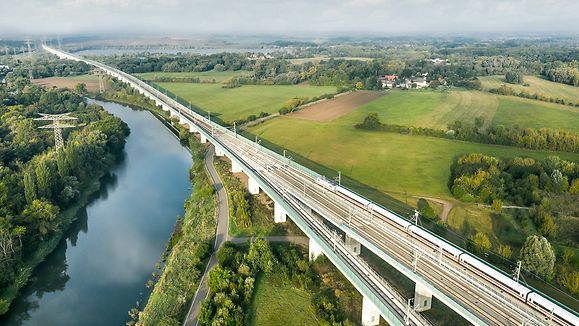Structural Change
News from the Regions in Structural Change
Oct 02, 2024
- Saxon roller to make hydrogen drive technology cheaper
- Wacker opens mRNA production center in Halle
- Morpheus Opens Electric Ion Drive Factory in Dresden
- TU Bergakademie Freiberg registers patents for hydrogen production from depleted gas and oil deposits
- Fraunhofer’s “Gearform” Production Method to Cut Wind Turbine Repair Costs
- Harz Start-up Seeks to Transform Battery Market
Saxon roller to make hydrogen drive technology cheaper
Engineers from Chemnitz and Bad Düben in Saxony have developed a new roll embossing machine to make hydrogen drive technology for trucks, airplanes and ships cheaper. Fraunhofer Forming Institute IWU (Chemnitz) and Profiroll (Bad Düben) are seeking to halve the cost for bipolar plates with the new solution. The “BPP Flexroll” will allow core components for fuel cells and electrolyzers to be produced both faster and cheaper than ever before, thanks to a process similar to newspaper printing. The BPP Flexroll machine is part of a larger Fraunhofer initiative in which the Dresden-based Fraunhofer Beam Institute IWS is also involved. It aims to significantly reduce the production costs of other fuel cell and electrolyzer components in Europe. This includes the continuous coating of electrode plates with particularly efficient materials, laser joining techniques and the like.
Wacker opens mRNA production center in Halle
Chemicals concern Wacker plans to produce millions of vaccine doses at its newly opened production center in Halle, Saxony-Anhalt. Active ingredients based on messenger ribonucleic acid (mRNA) will be manufactured at the new EUR 100 million facility. The expansion of the existing site to include the new mRNA competence center will see mRNA active ingredients produced at a large scale on four new production lines that triple previous production capacity. The company is set to make some of the new capacity available to the German government as part of its pandemic preparedness program, with the remaining capacity made available to other clients.
Morpheus Opens Electric Ion Drive Factory in Dresden
Aerospace company Morpheus Space has opened its first factory for electric ion drives in Dresden. The TU Dresden spin-off claims that the new site in Dresden-Übigau will be the first to mass produce “GO-2” drives for small satellites. The use of electric propulsion systems allows for inexpensive and economical propulsion systems for small satellites that to date have usually had no way to correct their course in the Earth’s orbit after ejection. The electric ion drive-powered propulsion systems will allow small satellites to avoid space debris and carry out more complex missions in the future. The nano-class drives can be combined into larger, scalable units for commercial satellite operation and space research institutes, with the company also seeing military use as a further area of application.
TU Bergakademie Freiberg registers patents for hydrogen production from depleted gas and oil deposits
Reservoir technology and fluid mining experts at TU Bergakademie Freiberg have registered two new patents that allow hydrogen to be produced from resources that can no longer be extracted by using remaining residues in crude oil and natural gas deposits. The new technology from Saxony may be able to help extract large quantities of hydrogen (H2) from depleted underground oil and gas deposits reports news portal Oiger. When crude oil or natural gas deposits are considered depleted, around 30 percent of the hydrocarbons originally present still remain underground. Researchers from TU Bergakademie Freiberg have modified the steam reforming process used to extract hydrogen from natural gas so that it can be used directly in an extracted reservoir in the future. TU Bergakademie Freiberg believes that the new technology will open up significant climate-friendly potential for the production of blue hydrogen that will conserve further fossil reserves.
Fraunhofer’s “Gearform” Production Method to Cut Wind Turbine Repair Costs
The Fraunhofer Forming Institute IWU in Chemnitz has developed a new production method to make wind turbines more resilient and eliminate the need for expensive repairs at sea and high altitudes. Using a hot rolling process, the new “Gearform” technique eliminates the need for laborious milling of large gear wheels. According to Fraunhofer, this can help reduce steel usage by up to 20 percent and cut production time by almost 90 percent – 60 minutes to six and a half minutes – for a milled gear. The 500 mm diameter and 9.5mmm module gear produced is the largest gear ever made using forming technology. Project partners – including Ema-Tec, Härterei Reese Chemnitz, Dreiling Maschinenbau, and Flender – specially manufactured a hot-rolling facility that heats the rolling blank to 1,200 degrees and incorporates the teeth into the component under rotational movement. The "GEARFORM: Energy and resource-efficient forming of large-module gears" project was funded by the Federal Ministry for Economic Affairs and Climate Action.
Harz Start-up Seeks to Transform Battery Market
A Harz start-up seeking to transform the battery market started operations at its new pilot facility in Gernrode in the Harz region in August. Efolion plans to make lithium-ion batteries lighter, less resource intensive and more efficient. Specialists at the company are working on a process to develop new battery current collectors in a process that sees glass fabric coated with a wafer-thin layer of copper and aluminum. Efolion believes that the new technology will increase battery capacity by 35 percent, with the use of metals used in production reduced by 90 percent. According to the company, this will make electronic devices more compact and powerful, thereby increasing the battery distance range significantly. The pilot project – which enjoys the support of Bergakademie Freiberg, TU Dresden, TU Munich, and RWTH Aachen University – expects the first batteries using the new technology to be available within the next two years.

